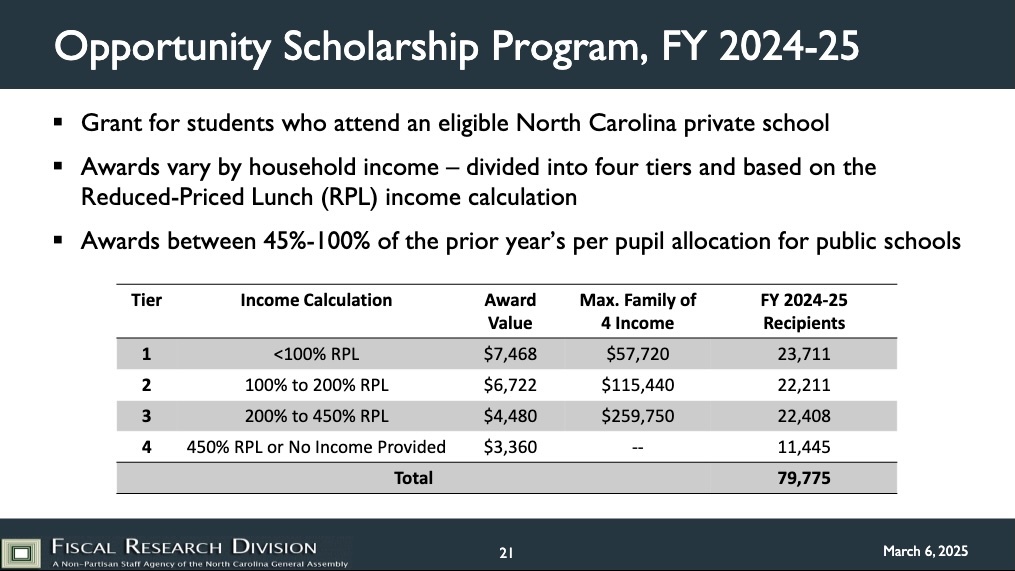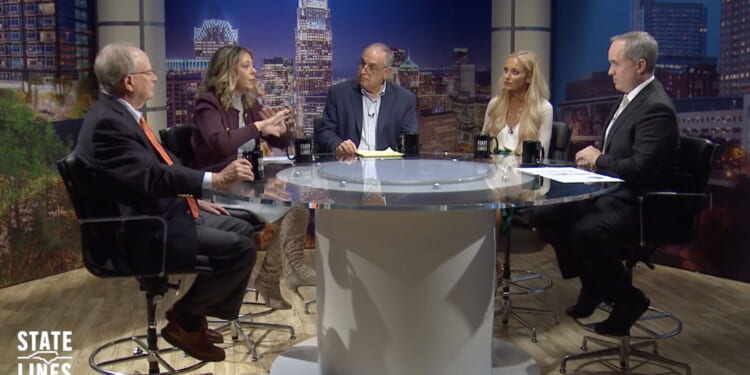- Contrary to the rehashed claims of opponents, North Carolina’s popular Opportunity Scholarship program helps many parents afford private schools
- The families with the greatest financial need are prioritized under the expanded program, receiving greater amounts and having their applications considered first
- Schools accepting Opportunity Scholarships must observe health, safety, testing, reporting, and nondiscrimination requirements, and they are held accountable also by parents
On a recent episode of State Lines on PBS North Carolina, panelists debated the merits of North Carolina’s Opportunity Scholarship program, a popular school choice program that helps parents cover the costs of private school tuition and fees. During the segment, opponents of Opportunity Scholarships rehashed several common objections, many of which have already been addressed multiple times by researchers at the John Locke Foundation.
Are Opportunity Scholarship awards actually enough to make a private school education within reach for most families? Does the program give money to unaccountable private schools?
This research brief will refute those claims, among others.
Claim: Opportunity Scholarships are not enough to cover tuition.
During the segment, former North Carolina Supreme Court Justice Bob Orr said, “The average cost I saw, I think, in our area for private schools is $10,000 to $30,000, and the voucher is $7,400. So low-income and moderate-income families might get a little help, but there’s still a big chunk.”
The implication here is that Opportunity Scholarship awards don’t provide enough money to put private school tuition within reach for most families. That’s not the case, however.
Just because Opportunity Scholarship awards may not cover tuition at the most expensive private schools doesn’t mean that they don’t help make private schools accessible for many families. A recent study by the John Locke Foundation, which surveyed private school leaders across the state, showed that the average tuition of responding private schools — many of which accept Opportunity Scholarship students — was $8,748, which was significantly lower than the statewide average tuition ($13,231 in 2024–25).
Additionally, Opportunity Scholarships are not the only source of tuition assistance for needy families. Many private schools offer financial aid packages to enrolled families. Locke’s survey found that the average aid package at responding schools was $5,071, or about 78 percent of the costs of tuition.
Claim: Opportunity Scholarships are subsidizing the education of wealthy families.
Justice Orr also stated, “No matter the income levels, rich people are getting vouchers just like poor people. … We’re seeing money go where it really doesn’t need to go, as opposed to what was the original scheme or plan for low-income [families].”
The implication here is that “rich” families — however defined — don’t deserve scholarships and should just pay full freight. But consider it the other way. The full average per-student expenditure in North Carolina public schools was $13,222 in 2023–24, whereas the average Opportunity Scholarship award was only $5,701. So, if two well-off parents decided to send their child to the assigned public school, would Orr or anyone else cry foul when that child was immediately funded at the much higher level? It’s doubtful. Why is it acceptable for taxpayers to subsidize the education of children from “rich” households if they enroll in public schools, but not if they enroll in private schools?
Is it true that public schools are accountable? Testing and data without consequences isn’t real accountability; it’s merely transparency.
Recall that the neediest families continue to be prioritized by the Opportunity Scholarship program. Not only are families in the lowest-income tier eligible to receive the largest award (up to $7,686 per year in 2025–26 compared with only up to $3,458 for families in the highest-income tier), but all applications from families in the lowest-income tier must be awarded before any other new applications (not considering renewals).Furthermore, a March 6 presentation by Stephen Bailey of the General Assembly’s Fiscal Research Division showed that the plurality of Opportunity Scholarship recipients in 2024–25 (29.7 percent) came from the lowest-income tier, while the tier with the fewest recipients (14.3 percent) was the highest-income tier. The same was true of applicants during the 2025–26 priority application period (29.5 percent were from the lowest-income tier, and 16.5 percent were from the highest-income tier).

Source: North Carolina General Assembly
Claim: Schools participating in the Opportunity Scholarship program are not accountable.
Campbell Law School professor Rick Glazier claimed, “[Private schools participating in the Opportunity Scholarship program] don’t have any testing or accountability. … I don’t think real testing and accountability measures like we use in the public schools are available.”
Certainly, public schools are subject to numerous testing and reporting requirements, but is it true that they are accountable? Have these requirements led to better outcomes?
The most recent round of state test scores revealed that only 56.7 percent of students were testing at grade level in math, and only 52.5 percent were testing at grade level in reading. Even smaller percentages achieved college and career readiness scores. Is anyone taken to task for such poor outcomes? Is anyone’s job at stake? Testing and data without consequences isn’t real accountability; it’s merely transparency.
In reality, private schools participating in the Opportunity Scholarship program must meet the same health, safety, and nondiscrimination statutes that other schools do. For example, in order to accept Opportunity Scholarship funds, schools must agree not to “discriminate with respect to race, color, or national origin.”
Second, Opportunity Scholarship schools are legally required to notify a child’s parents or guardians of his or her progress each year. They are also legally required to administer a nationally standardized test (or equivalent measurement) every year to students participating in the Opportunity Scholarship program.
Third, Opportunity Scholarship schools are legally required to conduct a background check “for the staff member with the highest decision-making authority.” Many schools likely do so for other staff members as well.
Other testing and reporting requirements are listed in the statute.
Finally, and more importantly, private schools are accountable — to parents. If parents aren’t happy with the education their child is receiving at a certain school, they will enroll that child in a different school that’s a better fit.
Claim: There is already choice in the public school system.
Professor Glazier also said, “It’s one thing to create choice, but public schools do have choice. And they’ve had choice for a long time with magnet programs, year-round programs, [and] college success programs.”
How much choice do parents really have in the public school system? Parents of students in Wake County Public Schools made headlines this week after district staff ignored their requests and left virtually untouched a proposed reassignment plan that would move hundreds of students to new schools even if their parents don’t want it. If the plan goes into effect, are these parents likely to feel that they had a say in which public school their children attend?
As one parent begged the school board, “Please stop using your time and resources to move families into underperforming schools. Please instead use your resources to improve the quality of the schools so that more families will want to move to areas bound to those schools.”
Magnet and year-round schools are good options for some students, but they are not available in every district. Furthermore, as the John Locke Foundation has observed, North Carolina is one of only a few states that does not have statewide open enrollment, a policy that lets parents enroll their children in a traditional public school other than the one to which they are assigned based on their home address. In a 2024 ranking of the 50 states’ open enrollment policies, North Carolina tied with three others for dead last. The state’s ranking had not improved by 2025.
Some districts throughout North Carolina have adopted limited open enrollment policies that let students transfer to other public schools within their home district, but most have not. Allowing all students throughout the state to choose their public school would truly promote choice within the public school system.











